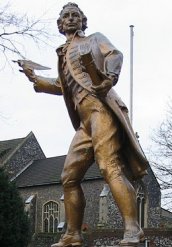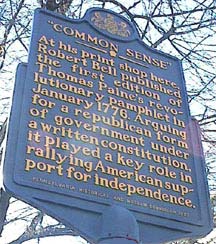Thomas Paine
The principle of an equality of rights is clear and simple. Every man can understand it, and it is by understanding his rights that he learns his duties; for where the rights of man are equal, every man must, finally, see the necessity of protecting the rights of others, as the most effectual security for his own. -- Thomas Paine
The sublime and the ridiculous are often so nearly related, that it is difficult to class them separately. -- Thomas Paine
These are the times that try men's souls. -- Thomas Paine
 Thomas Paine, (1737–1809), English political philosopher, whose pamphlet Common Sense greatly influenced public opinion during the American Revolution and The Rights of Man, seen as the foundation of modern democracy, was the driving force of the Atlantic-Democratic Revolution of the late 18th century. He personified the political currents that linked American independence, the French Revolution and British radicalism. He was to die a pauper, alone and forgotten.
Thomas Paine, (1737–1809), English political philosopher, whose pamphlet Common Sense greatly influenced public opinion during the American Revolution and The Rights of Man, seen as the foundation of modern democracy, was the driving force of the Atlantic-Democratic Revolution of the late 18th century. He personified the political currents that linked American independence, the French Revolution and British radicalism. He was to die a pauper, alone and forgotten.
Born 29 January 1737, in Thetford, Norfolk, England, son of a corseter, he had failed school by the age of 12. The young Paine began an apprenticeship with his father, but again, he failed. Now, age 19, Paine went to sea. This adventure didn't last too long, and by 1768 he found himself as an excise officer in England. He didn't exactly excel at the role, getting discharged from his post twice in four years, the final straw was the publication of The Case of the Officers of Excise (1772), arguing for a pay raise for officers.
 Paine emigrated to Philadelphia in 1774, with introductions from Benjamin Franklin, who then represented the American colonies in Great Britain. Once there, he found his feet as editor of the Pennsylvania Magazine and published other writings. 1 January 1776, Common Sense was published. In a dramatic, rhetorical style, it argued that the American colonies received no advantage from their mother country, which was intent on exploiting them, and that every consideration of common sense called for the colonies to become independent of Great Britain and to establish a republican government of their own. Published anonymously, the pamphlet sold more than 500,000 copies and helped encourage the issuance of the Declaration of Independence half a year later.
Paine emigrated to Philadelphia in 1774, with introductions from Benjamin Franklin, who then represented the American colonies in Great Britain. Once there, he found his feet as editor of the Pennsylvania Magazine and published other writings. 1 January 1776, Common Sense was published. In a dramatic, rhetorical style, it argued that the American colonies received no advantage from their mother country, which was intent on exploiting them, and that every consideration of common sense called for the colonies to become independent of Great Britain and to establish a republican government of their own. Published anonymously, the pamphlet sold more than 500,000 copies and helped encourage the issuance of the Declaration of Independence half a year later.
During the American Revolution Paine wrote a series of pamphlets, entitled The American Crisis, that George Washington ordered read to his troops to improve their morale; the first of these opened with the famous words "These are the times that try men’s souls." In 1778 Congress appointed Paine secretary of the committee of foreign affairs. After losing the post during a political dispute, he became clerk of the Pennsylvania legislature. Acknowledging that much of Paine’s public service had been at his own expense, in 1785 Congress awarded him $3000 and New York State gave him a confiscated Royalist farm in New Rochelle.
Paine returned to Great Britain in 1787, and in 1791–92 he published The Rights of Man, in two parts. Written as a response to the attack on the French Revolution, Reflections Upon the French Revolution, by Edmund Burke. It was a radical and inflammatory work, calling as it did for representative democracy, and it was also an analysis of the weaknesses of European society, proposing republican government and progressive income taxes. A million and a half copies were sold in England alone. The British government indicted Paine for treason for his anti-monarchy views, and he fled to France.
In France Paine was elected a deputy to the National Convention, and he generally voted with the Girondists. By opposing the execution of Louis XVI, Paine favored his exile, he incurred the wrath of Maximilien de Robespierre, the leader of the radical faction, and he was imprisoned for 11 months until Robespierre’s downfall in 1794. That year Part I of his book The Age of Reason was published; Part II appeared in 1795 and a portion of Part III in 1807. Although it favors deism while opposing atheism and Christianity, the book gained him ill repute as an atheist and alienated most of his old friends.
Paine eventually became disgusted with French politics and concentrated on the study of finance until 1802, when he returned to America in a ship placed at his disposal by President Thomas Jefferson.
Back in America, Paine found his contribution to the revolution all but forgotten. Derided by the public and abandoned by his friends for his religious views, he died in 1809 in New York City, a drunk and a pauper.
Ten years after Paine's death, the radical reformer, William Cobbett, dug up the bones and brought them back to England. The whereabouts of his remains are unknown today.
Major works
Thomas Paine's house in Thetford has been destroyed. The local council stood idly by and let it be destroyed. A group of Americans horrified by this wanton destruction raised the money and had a statue to commemorate Paine erected on the site.
Edmund Burke (1729-1797), parliamentarian and political thinker, was in favor of reform, but fearing mob rule vehemently opposed the French Revolution. His attack on the French Revolution in Reflections on the Revolution in France (1790), provoked a huge response, including Thomas Paine's The Rights of Man and Mary Wollstonecraft's Answer to Burke's Reflections on the French Revolution and the unfinished Historical and Moral View of the French Revolution (1794).
William Cobbett (1762-1835), farmer, pamphleteer, radical, social commentator and reformer, started out in life as a crow-scarer and ploughboy. He founded the Political Register, published accounts of Parliamentary debates, which were later to become Hansard. His Rural Rides are the best insight we have to social conditions during his lifetime.
Mary Wollstonecraft (1759–1797), mother of Mary Shelley and wife of William Godwin, who she married in in 1797, died giving birth to her daughter Mary. Mary Wollstonecraft was a leading feminist, member of a group of radical intellectuals called the English Jacobins and author of A Vindication of the Rights of Women (1792), which demanded equal educational opportunities for women.
Web Resources
Literature ~
William Cobbett ~
Mary Wollstonecraft
(c)
Keith Parkins 2003 --
August 2003 rev 0
 Thomas Paine, (1737–1809), English political philosopher, whose pamphlet Common Sense greatly influenced public opinion during the American Revolution and The Rights of Man, seen as the foundation of modern democracy, was the driving force of the Atlantic-Democratic Revolution of the late 18th century. He personified the political currents that linked American independence, the French Revolution and British radicalism. He was to die a pauper, alone and forgotten.
Thomas Paine, (1737–1809), English political philosopher, whose pamphlet Common Sense greatly influenced public opinion during the American Revolution and The Rights of Man, seen as the foundation of modern democracy, was the driving force of the Atlantic-Democratic Revolution of the late 18th century. He personified the political currents that linked American independence, the French Revolution and British radicalism. He was to die a pauper, alone and forgotten.
 Paine emigrated to Philadelphia in 1774, with introductions from Benjamin Franklin, who then represented the American colonies in Great Britain. Once there, he found his feet as editor of the Pennsylvania Magazine and published other writings. 1 January 1776, Common Sense was published. In a dramatic, rhetorical style, it argued that the American colonies received no advantage from their mother country, which was intent on exploiting them, and that every consideration of common sense called for the colonies to become independent of Great Britain and to establish a republican government of their own. Published anonymously, the pamphlet sold more than 500,000 copies and helped encourage the issuance of the Declaration of Independence half a year later.
Paine emigrated to Philadelphia in 1774, with introductions from Benjamin Franklin, who then represented the American colonies in Great Britain. Once there, he found his feet as editor of the Pennsylvania Magazine and published other writings. 1 January 1776, Common Sense was published. In a dramatic, rhetorical style, it argued that the American colonies received no advantage from their mother country, which was intent on exploiting them, and that every consideration of common sense called for the colonies to become independent of Great Britain and to establish a republican government of their own. Published anonymously, the pamphlet sold more than 500,000 copies and helped encourage the issuance of the Declaration of Independence half a year later.